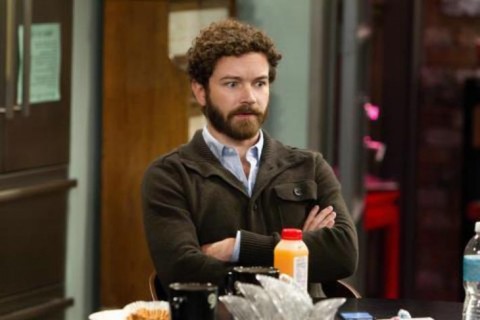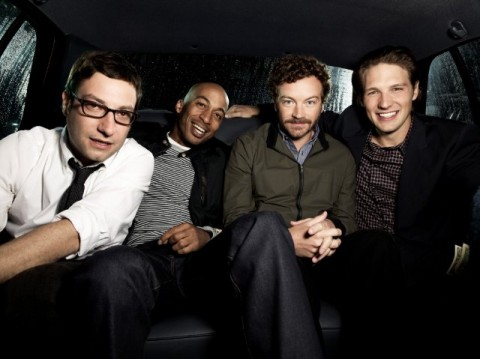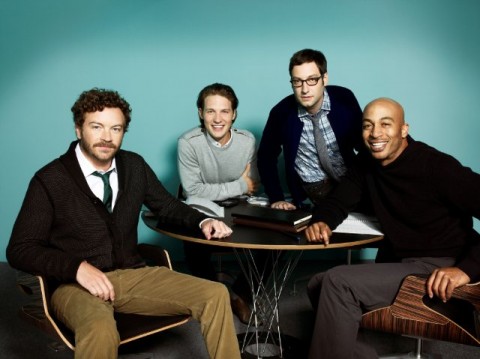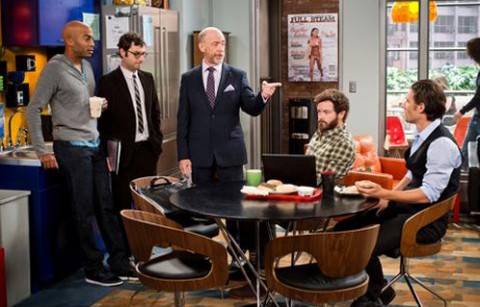The Light from the TV Shows: A Chat with Danny Masterston (“Men at Work”)
After 200 episodes of “That ’70s Show,” Danny Masterson would be well within his rights to stay away from sitcom work for the rest of his life, reasonably claiming, “I’ve done my time,” but to hear him talk about the experience of doing TBS’s “Men at Work,” which returns for its second season tomorrow night at 10pm, there’s no question that he’s doing something that makes him very happy, indeed. Bullz-Eye talked to Masterson in conjunction with the start of the show’s new season, and he chatted about how his character, Milo, has changed a bit, which guest stars he’s most enjoyed, and why he prefers sitcom gigs over hour-long dramas.

Bullz-Eye: Just the fact that “Men at Work” has gotten a second season, period, has got to be pretty thrilling in and of itself, but how was it to go back to work for season two?
Danny Masterson: You know, it’s funny: we actually only took about six weeks off, so we didn’t feel like we had a whole summer hiatus. We just took six weeks, and then we kept going with the same director and same crew, so it just feels like a really long first season that we’ve shot. We just had a lot of excellent new guest stars, I guess.
BE: Yeah, the list is pretty impressive.
DM: Thanks! I think it’s sort of a benefit of having both Breckin (Meyer) and I both working since we were little kids. We’ve worked with a lot of people who are known actors, so it’s fun to sort of bring those friends in to work with you for a bit.
BE: When you guys came onto the series, how well-defined were the characters on the page versus what they became once they were actually cast?
DM: You know, I think they were pretty well defined. Breckin sort of based them off…well, he based my character, Milo, off himself. [Laughs.] And the three friends are based off of his three best friends. So pretty much everybody knew exactly who they were in the beginning. And then, obviously, as you’re going through the episodes, you sort of change your characters a little bit to make them suited towards you a little bit, just in terms of everyone’s own personalities. But I’d say 95% is exactly how Breckin wrote it to begin with.

BE: Did the cast bond pretty quickly?
DM: Yeah, I’d say so. I’ve known James Lesure for…I dunno, maybe 10 years. I hadn’t met Adam (Busch) or (Michael) Cassidy before, but, y’know, right from the table read everyone was really excited to have a really cool job, so… I get along with everybody, and they’re all really great people. Three totally different personalities, but we’ve never had a single fight. I mean, it’s only been two years, obviously, so we’ll probably wrestle at some point. [Laughs.] But they’re really fun. Everyone’s really stoked to have a good job, we all enjoy it, and as long as the writing stays good – and the writing’s been really good – I think we’ll all stay really happy.
BE: Speaking of writing, as a writer, I have to wonder how many times you’ve heard from various critics that, uh, not many magazine offices tend to run the way the one on “Men at Work” does.
DM: [Sighs.] Um…y’know, honestly, we’re entertaining people. We’re doing a situation comedy. We’re just there to make people laugh. So…I mean, it’d be like every lawyer watching “L.A. Law” and going, “You know, that’s not really what court’s like.” [Laughs.] It’s just one of those things..
BE: As you mentioned, you’ve got several new guest stars coming up for season two, but who were your favorites from season one?
DM: Y’know, it was super fun, obviously, working with (Laura) Prepon again, having spent eight years with her (on “That ‘70s Show”), so that was just sort of, like, every time we would say, “Cut,” we’d just start laughing. It was, like, “Oh, my God, this is ridiculous. This is just like what we used to do together.” And then, for me, working with Kevin Pollak, who I’m just such a massive fan of and who’s a friend of mine, but it’s still, like, “I can’t believe I get to be friends with Kevin Pollak!” [Laughs.] So to get to do that episode with him, the scene about the toilet bowl, was definitely a highlight. And it was probably the only scene that year that I had a hard time getting through. I just kept breaking and laughing every time. It was great.

BE: I was surprised that your brother (Christopher Masterson) turned up on the show playing someone other than your character’s brother. Was that just deemed too obvious?
DM: Well, y’know, it’s one of those things where the scripts come out and Breckin says, “Oh, we have this role for someone and that role for someone,” and when he said, “We have this role for this really strange, weird guy…” It could’ve been any kind of character. We didn’t know what Chris was gonna do when he came in. The character was not supposed to have an accent of any sort or…be any sort of persuasion or anything. [Laughs.] He just came in and, at the first rehearsal, just started doing that character, and everyone started laughing. That’s basically what happened.
BE: To bring it to season two, would you say that Milo has changed at all since we saw him in Season 1?
DM: Yeah, I’d say so. In season two, we have a really good relationship arc with Sarah Wright that’s really funny, where he goes from not being able to handle chatting with girls, then all of a sudden he has this girlfriend that he doesn’t know what to do with. And they very quickly become a very boring relationship that seems like they’ve been together for 20 years, even though they’ve only been together for a few weeks. So that was fun playing the exact opposite of season one. Otherwise, you know, it’s sort of the same thing in terms of Milo doing something kind of stupid and the guys sort of getting on him. He does something idiotic, and the other three pounce on him. That’s what’s been the most fun to do, character-wise.
BE: It’s great to see that you’ve brought back J.K. Simmons for this season.
DM: Oh, yeah, he’s done a few episodes, and he’s in the season finale. He’s so funny, and getting to work with him is amazing.

BE: How much of the show is scripted, and how much of an opportunity do you have to adlib?
DM: There’s basically zero adlibbing.
BE: Really?
DM: Yeah. Y’know, there are certain shows where there’s a lot of improv, and there are shows where there isn’t. When I was doing “That ‘70s Show,” Bonnie and Terry Turner kind of beat improv out of us. [Laughs.] We’ll definitely have…we’ll shoot a scene twice, and then if there are any jokes where it’s, like, “Let’s try this,” or, “I have a joke!” Everybody pitches everybody jokes, you pitch the writers, the writers pitch you, and if you find something that’s funny, then you might do two or three different pick-ups with alternate jokes. But that’s not really improv. That’s like being in the writer’s room, and then you go ahead and perform it. There’s never really any sort of curveball thrown. And that makes it easier, really, because you don’t have everybody trying to do one-ups and shit. The writers do their jobs, and as actors, we do our jobs.
BE: Setting aside “Men at Work,” what would you say is your favorite project you’ve worked on over the years that didn’t get the love you thought it deserved?
DM: Um…that’s a good question. I would say the movie “The Brooklyn Heist,” which I made in New York and produced. I thought that turned out really, really good. Y’know, we got a small theatrical release in New York, but a lot of people haven’t seen it. I don’t think it’s ever gotten a TV deal. It seems like these days you make a movie and…it used to be that people would see it on HBO or Showtime years later, but that doesn’t seem to happen as much anymore. I think it’s because of iTunes and downloads and all that stuff. But I think that movie, for the amount we shot it for and the way that it was shot, genre-wise, it was really, really smart. So, yeah, “The Brooklyn Heist,” that’d probably be my one that people would enjoy.
BE: You know, “Star Kid” is now on Netflix on Demand.
DM: Wow. You know, I’ve never actually seen that. What do I have, like, one scene in that movie? [Laughs.]
BE: Not significantly more than that, anyway.
DM: Ashlee Levitch, who plays the older sister in that movie, used to be a very good friend of mine. I haven’t seen her in probably 15 years, but when we were teenagers, she was always on a show, I was always on a show, so she called and said, “Hey, I’m doing this movie with the kid from ‘Jurassic Park’ (Joseph Mazzello), would you come play my boyfriend? It’s just for a scene or two.” So I said, “Yeah, okay, sure!” That’s literally how I got that movie. I never even saw the script. But I remember it was actually called “The Warrior of Waverly Street” when I signed onto it.
BE: You did some film work after “That ‘70s Show,” but do you enjoy returning to the routine of series television?
DM: Oh, yeah, I love it. And I definitely wasn’t looking to do a drama. I did a one-hour drama when I was 18, and it’s just such a brutal lifestyle. I mean, that’s a schedule that…most actors who are on one-hour dramas are leads, which means no life for 10 months out of the year, and if it goes for 10 years, then that’s sort of who you are. For me, doing a sitcom is…I mean, toward the end of “That ‘70s Show,” we were working 20 hours a week to get the show together, but on “Men at Work,” we’re obviously working a lot longer, because it’s newer and not everybody knows what they’re doing exactly…including myself, because we’re all still sort of getting to know each other. But it’s basically just summer camp all day, every day. You’re literally just rehearsing to make each other laugh, making fun of each other, and trying to get it ready to do it in front of a live audience. There’s really no better job in show business.
Related Posts
Comments Off on The Light from the TV Shows: A Chat with Danny Masterston (“Men at Work”)
Posted in: Entertainment, Interviews, News, Television
Tags: Adam Busch, Bonnie Turner, Breckin Meyer, Christopher Masterson, Danny Masterson, J.K. Simmons, James Lesure, Joseph Mazzello, Jurassic Park, Kevin Pollak, Laura Prepon, Men at Work, Michael Cassidy, Sarah Wright, Star Kid, TBS, Terry Turner, That '70s Show, The Brooklyn Heist, The Light from the TV Shows, The Warrior of Waverly Street, Will Harris








